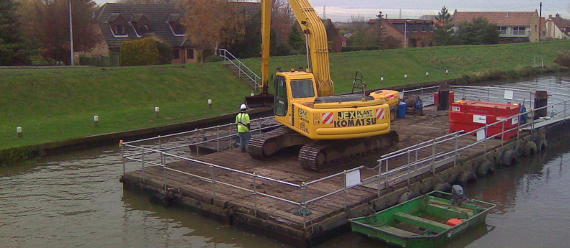 I recently chanced upon the website of the Flood Prevention Society, a voluntary organisation that tries to shape public policy on flooding. Their website has a long and detailed report on some of the floods in recent years and, for those with less time on their hands, a snappy "Urban myths about flooding" page. They seem less than impressed with the Environment Agency, and indeed with George Monbiot's ideas about grouse moors and flooding. I reproduce the whole thing here.
I recently chanced upon the website of the Flood Prevention Society, a voluntary organisation that tries to shape public policy on flooding. Their website has a long and detailed report on some of the floods in recent years and, for those with less time on their hands, a snappy "Urban myths about flooding" page. They seem less than impressed with the Environment Agency, and indeed with George Monbiot's ideas about grouse moors and flooding. I reproduce the whole thing here.
1. “Increased flooding is because of more land drainage”.
The opposite is true. During the last Great War and for years after to produce more food and later help the balance of payments, farmers were given a 50% capital grant by Governments to clean ditches, brooks and land drainage. This grant ceased over 30 years ago – so while flooding is on the increase, land drainage is on the decrease.
2. “Modern farming with heavy tractors and machinery causes a plough pan seal (compaction) in the land preventing it soaking up rain, so the rain runs straight into rivers”.
Modern farmers also use subsoilers that break up any plough pan letting air and moisture penetrate up and down – so no change.
3. “Rainfall running off moorland causes urban flooding”.
If it did, as the annual rainfall has not increased, so why are thousands more homes and businesses getting flooded. Moorland has natural boggy areas where the water table can be kept low by drainage channels maintained in good condition. Now with Natural England imposing SSSI control on many moors they have closed the drainage channels, so the water table has lifted leaving no sponge rainwater absorbing affect, therefore the rain now runs off the moors far more quickly. We have the wisdom of ‘hands on experience’ on this subject.
4. “Non porous paving on forecourts, house drives and paths causes rainwater to fill the rivers more quickly”.
Compared to current EA policy of not dredging rivers, the affect of non porous surfaces is negligible – if it has any affect at all, it would be equivalent to shuffling the deck chairs on the Titanic.
5. “Some salmon and trout ‘experts’ say “leave rivers undredged – it is better for the fish”.
This totally incorrect view is confounded in figures published by the EA in the 2009 salmon count which said that the count was the lowest on record. So while rivers are left neglected for 15 years fish are on the decline, likewise water voles are now only found in 6% of their former range say the EA.
6. Another comment by the EA is “If we dredged there is nowhere to put the spoil dredged out”.
The river boards, before EA control, managed to do it – it is very fertile material, most farms have hollows in fields and farmers would be glad of it. It is also good to build up river banks, but it cannot be done by sitting in an office playing with computers creating more flood plains. The Manchester Ship Canal was built in 13 months for Ocean going ships with a minimum water depth of 28’ and bottom width of 120’. The spoil dug out was moved with wheelbarrows and horses and carts – where there is a will there is a way. It was built by private enterprise.
7. Another comment by the EA “We can’t use the spoil dredged out to top up river banks because it is porous”.
We know of river banks built up over 100 years ago by dredged silt with a sandy nature and they have been perfect. A Dutch dredger came up the River Dee 50 years ago depositing the silt by building up its banks. These banks still contain the highest tides of the year despite the river bed now badly being silted up.
8. “Floods caused by farmers not cleaning silt and debris out of ditches”.
It is correct that roadside drains discharge into farm ditches. Most farmers know the importance of ditch dredging but many are frustrated by the fact that where they discharge into a tributary designated main river – under the control of the EA – whose policy of not dredging has caused the silt to build up higher than the discharge points of the farm ditches and land drains.
The worst case of road flooding in our area at times of high rainfall is caused by the EA not dredging a main river tributary. The rain water runs backwards up a farm ditch, runs backwards out of the road drainage grid – floods the road – and then often freezes leaving a sheet of ice on a T junction where cars spin off the road.
9. “Should local councils advise the EA of the need to dredge main rivers in their area”.
They often do, but they get the reply back by word or letter saying that there is no benefit in dredging.